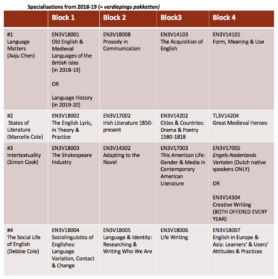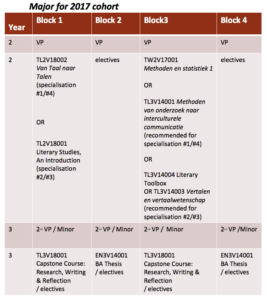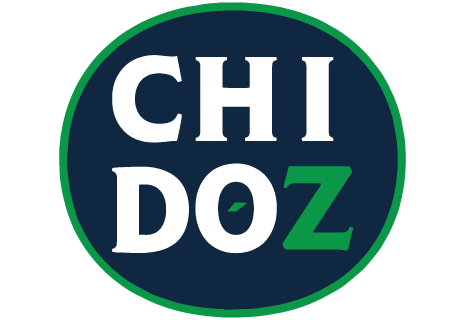Bachelor’s Degree
Bachelors Degree English Language & Culture
The full Bachelor’s programme English Language and Culture takes three years. Each year consists of four blocks of ten weeks and ends with an exam week. In your first year, you will attend an average of 12-18 hours of education per week, taught entirely in English from day one.
Year 1
In your first year, you follow a series of courses as a basis for the rest of your Bachelor. These courses are compulsory and every first-year English student takes 60 EC.
Study period 1
→The Sound Lab
Improve your speaking proficiency by practising your pronunciation, among other things, and improve your listening skills too.
→The Writers’ Lab
Improve your writing by focusing on skills such as developing an argument, reading English literature classics, working through a writing and editing process and having discussions.
Study period 2
→ Prescribing and Describing English
Everything there is to know about English grammar, in both historical English as well as contemporary English. Learn to apply the most commonly used grammatical rules and become acquainted with different accents in English.
→ Bede to the Bard: English Literature 449-1649
In this introduction to English literature from the early middle ages to the death of Charles I, you will read texts and analyse their relationship to society during that period.
Study period 3
→ Foundations of English Linguistics
This course provides an introduction to core concepts in the areas of syntax, morphology, phonology and phonetics, aiming at a sophisticated understanding of native speakers’ unconscious knowledge of the structure of English words and sentences, and a basic understanding of the way in which this knowledge is acquired.
→ Milton to the Millennium: English Literature 1650-2000
Read modern literature and learn about the historical significance of these texts, while also learning to write an academic essay about the texts you have studied.
Study period 4
→ Language Development Across the Lifespan
How do people learn languages? Is there a difference between the way children and adults acquire a second language? Study research dealing with these questions and carry out your own research project.
→ Civil War to Civil Rights: American Literature (1860s-1960s)
This course introduces some of the key literary works of American literature written or set during the mid-nineteenth to mid-twentieth century (1860s to 1960s).
Year 2
Specialisation
From the second year you will delve into the field of English language and culture of your choice. You can choose from various related courses. Each specialisation consists of four courses. In the course descriptions of the 2nd year you will find which courses belong to which specialisation. The names and courses within these specialisations can vary. You will also find this in the course overview. In the even academic years, subject A is offered, in the odd academic years subject B. An in-depth package consists of about 30 EC, in addition there are other compulsory courses, and there is room for electives (these are further explained under specialisation).

→Specialisation 1 & Speciliasation 4 with, in year 2 block 1,TL2V18002 Topics in Linguistics
→Specialisation 2 & 3 with, in year 2 block 1, TL2V18001 Literary Studies, An Introduction
Specialisation 1: Language Matters
Immerse yourself in English and learn to analyse the language in different ways through attention to subjectslike syntax (rules governing sentence structure), semantics (meanings of words and phrases), pragmatics (meanings of sentences in context), and prosody (melody of speech). Study the different ways that English is acquired (as a first and second language), and how different aspects of the language are used in communication. Explore too the earlier stages of English and how and why the language has changed over the course of time. This specialisation provides a strong foundation for the Master’s programmes in multilingualism and language acquisition, as well as the research Master in linguistics and the teacher training Master’s programme. Click here for more information about the courses.
Specialisation 2: States of Literature
Study the literature of the British Isles within cultural-historical and national frameworks, and prepare yourself for Master’s programmes in the field of historical and modern literature. This specialisation is also a good basis for the teacher training Master’s programme, where you will learn to create a literature lesson plan. Click here for more information about the courses.
Specialisation 3: Intertextuality
Upon completion of these courses, you will have acquired the requisite literary knowledge to conduct research within the areas of creative writing and translation. Learn to approach literature from both theoretical and practical perspectives, while deepening your understanding of translation by means of a case study. You will apply your knowledge in the Creative Writing course. This specialisation provides a strong foundation for translation, but is also compatible with the teacher training Master’s programme. Click here for more information about the courses.
Specialisation 4: The Social Life of English
This specialisation focuses on how people use varieties of English and other languages in different contexts.You will learn theory and research practices from the fields of sociolinguistics, linguistic anthropology, life writing, and language pedagogy. You will study and write about connections between language variation and identities while considering applications for educational contexts. This specialisation provides a strong foundation for the Master’s programmes in multilingualism and language acquisition, intercultural communication, as well as the teacher training Master’s programme. Click here for more information about the courses.
Year 2+3
Electives
In your second and third year there is room for profiling, in which you can follow courses from other studies or from other in-depth packages. In the second year you can choose diverse electives in block 2 and block 4.
In your third year you have even more room to choose. Here you can opt for a Minor in another field, an internship or, for example, studying abroad. In your third year it is customary to write your Bachelor’s thesis. In preparation for your thesis, you will be given a course in block 1 or block 3 of your third year that will prepare you for this. You can then start writing your thesis as soon as you have completed the Capstone Course.

EN3V14001BA Thesis Written in year 3 block 2, 3 or 4 after the COMPULSORY Capstone Course. Second VP/Minor can be replaced by 30 ECTS abroad.




